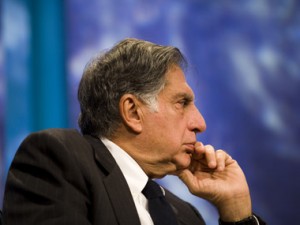The oncoming slowdown and the gathering storm over political corruption and crony capitalism - captured in gory detail through the 2G spectrum scandal which has embroiled everyone from Ratan Tata to the junior Ambani - could mark the beginning of the end of Indian business houses as we know them. Used as they are to conglomerate thinking and corporate cross-holdings driven the need to have effective control without adequate personal investment, they will be up against a hostile business environment in a rising interest rate scenario.
In many ways, the Tatas, Birlas, Ambanis and Ruias of the world are T-Rexes. They belong to a bygone era of business and have no place in the future. I don’t mean their companies won’t exist; just that they can’t exist as business groups. They are still around only because of India’s imperfections, where growth has been facilitated by cronyism, corruption, and easy money - usually somebody else’s. No Indian business has grown with its own money beyond a certain size. It is always someone else’s money, someone else’s risk finance.
[caption id=“attachment_681” align=“alignleft” width=“300” caption=“Tata Group chairman Ratan Tata. Brian Harkin/Getty Images”]  [/caption]
The last seven years have been even more salubrious for Indian entrepreneurs to indulge their fantasies and get into areas outside their competence. Thus, Mukesh Ambani got into retailing, Anil into entertainment, the Birlas into telecom and retail, and so on. They are all going to regret it. If they don’t dump their outlying businesses voluntarily, the market will force them to. For the plain fact is that they don’t have the private wealth required, or the competence, to grow so many businesses globally. They can induct professional employees and investors, but then they have to shed control.
Conglomeracy is usually the result of greed, lack of focus, excess availability of risk capital and an uneven regulatory environment. Businessmen think of diversification and conglomerates just as a glutton thinks of food: since there is so much of it available, I must eat it all. In India, businesses became conglomerates due to long years of the licence raj. Till 1992, an industrial licence was essentially a licence to print money; if there was no money in it, businessmen left banks holding the sack, since most of the money was anyway borrowed. Even normally focused MNCs got into the bad habit. Hindustan Lever (now Hindustan Unilever) got into chemicals and shoes. ITC went into hotels and paper. Brooke Bond into blades and meat-packaging (of all things!). They were largely diversifying into disaster. The rare successes were largely the result of chance and fortuitous circumstances.
When the licence raj ended, greedy businessmen continued the binge till hard times returned in the second half of the 1990s. Suddenly, they started divesting businesses and returning to the core. Ranbaxy shed it non-pharma businesses. L&T shed cement - and a lot of tears (since it was forced to do so by the Birlas). Even the Ambanis - never known for giving up anything - gave up L&T. None of them has looked back since.
But after 2003, when money again began flowing like water in the Indian markets, the bad habits returned. In the post-Lehman periond, when money became easy once again, we now have business houses that are even more diversified. Bajaj has got into insurance. The Tatas have invested heavily in capital-intensive businesses - steel, automobiles and telecom, among others. And the reason they are able to do it is because of Tata Consultancy, which is a cash cow. Essentially, the Tatas are milking the cash cow and feeding it to cash-guzzling businesses, which ought not to be the case. If Tata Consultancy did not have to fund the rest of the group, it would be giving the Microsofts of the world a run for their money. Instead, it is financing the acquisition of steel plants, car-makers, and telecom companies worldwide. The Radia tapes affair is an indirect acknowledgement by the Tatas that telecom needs to fend for itself. And if having a pushy lobbyist helps, so be it.
This kind of conglomerate thinking will not survive the next global and Indian slowdown of the next few years. While the world is still awash in cash, in India money is getting harder to come by. But the world economic climate can get worse. The US has to, at some time, start reining in the flow of easy money; Europe is just one or two missteps away from financial crisis that could up-end the euro; the Gulf sheikhdoms are shaken; Japan is roiled by the N-quake; China has to slam the brakes to tackle inflation. The Indian economy is living a charmed life, but something could go wrong anytime.
There are only two options for Indian business houses in this scenario. One, they can reduce their holdings, professionalise and get other shareholders to fund their businesses. Or two, they can shed non-core businesses and remain business houses for some more time. They can also do both - which is the best course of action. History is not on their side. Conglomeracy is dying, and it will die faster in periods of tough market conditions.


)
)
)
)
)
)
)
)
)



